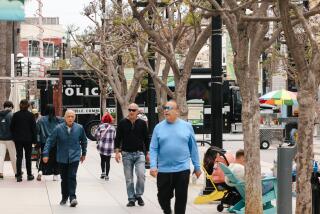Wounded Patron’s Case to Be Heard : Courts: Good Samaritan was shot when he heeded clerk and tried to stop fleeing robber. State justices will decide whether man can sue the store for monetary damages.
- Share via
SAN FRANCISCO — The state Supreme Court agreed Thursday to decide whether a good Samaritan who was shot and wounded while responding to a clerk’s plea to stop a fleeing robber can sue the store for monetary damages.
In a brief order, the justices said they will review a ruling by a state appeals court in November that said crime victims’ cries for help could expose them to civil liability for injuries to those who respond.
The appeals panel said the store owner and the clerk had a duty to prevent harm to customers. The wounded patron was entitled to a jury trial over whether the clerk was inadequately trained and was negligent in calling for help to stop a robber, the court said.
“While laudatory in the abstract, present day reality suggests such an attempt (to stop a robber) is foolhardy, at best, and at worst, extremely dangerous,” Appellate Justice Art W. McKinster wrote in a 3-0 decision.
Thursday’s action enables the high court to resolve conflicting lower court rulings about the potential liability for fast-food outlets, convenience stores and crime victims when calls for assistance lead to injuries to good Samaritans. The justices did not set a hearing date.
Lyn Skinner Foster of Los Angeles, attorney for the store facing suit, welcomed the justices’ grant of review. “This is a very significant issue,” she said. “We’re all potential victims and (under the appeal court ruling) potentially liable for reacting to a robbery.
“The store clerks of the world are particularly in a very dangerous situation, working in what’s practically a battlefield these days,” Foster said. “To place the threat of litigation over their heads for reacting to a crime is very unfair.”
Richard E. Rader of Santa Barbara, lawyer for the wounded customer, expressed hope that the high court would clarify the extent of liability in such cases and allow for damages where store owners and others clearly have a duty to protect customers.
“It is common knowledge that all-night convenience stores are almost an invitation to a holdup,” Rader said. “If you are going to operate such a store, you are going to have to exercise reasonable care to make sure patrons don’t get injured in an armed robbery.”
The case began in March, 1988, when Bradford P. Robbins and his brother entered a 7-Eleven store in Riverside about 11 p.m. According to Robbins’ attorneys, a man came running out, followed by a clerk who shouted: “Stop that guy!”
Robbins gave chase. The man, later charged with armed robbery, ran toward a pickup truck, then wheeled, pulled out a sawed-off shotgun and shot Robbins in the chest, causing serious wounds.
Robbins brought suit against Southland Corp., owner of the store, charging that the clerk’s call for aid was dangerous and that Southland had not adequately trained its employees. The clerk should have warned his customer that the robber was armed, the suit said.
A Riverside County Superior Court judge dismissed the suit, finding that Southland had no duty to protect Robbins. But a state Court of Appeal in San Bernardino reinstated the suit, saying Robbins was entitled to take the case to trial.
McKinster, joined by Appellate Justices Howard M. Dabney and Robert J. Timlin, said that Southland and its employees owed Robbins a duty to provide “ordinary care” to prevent harm from their conduct. Whether the company violated that duty under these circumstances should be left to a jury, McKinster wrote.
The panel stopped short of imposing a duty on the company to protect its stores with security guards, but did note that all property owners are obligated to offer reasonable protection to visitors against foreseeable acts of violence.
More to Read
Sign up for Essential California
The most important California stories and recommendations in your inbox every morning.
You may occasionally receive promotional content from the Los Angeles Times.













